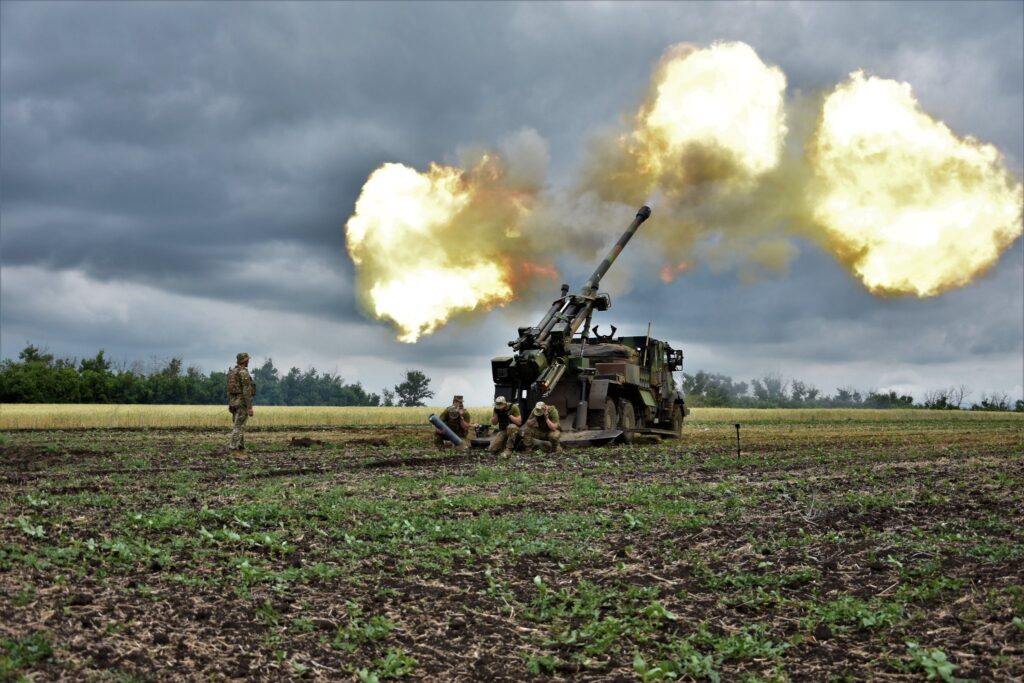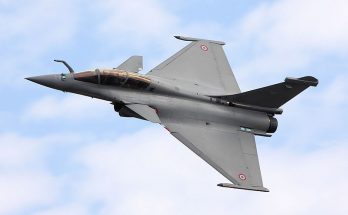
French-made howitzers will soon be in service with the Armenian Army, adding to a growing list of French military deals with the Caucasus country. On June 18, French Minister of Armed Forces Sébastien Lecornu announced on his X social media page that Paris and Yerevan reached agreement for Armenia to acquire CAESAR 155mm self-propelled howitzers, produced by KNDS. The deal represents a “new important milestone” in relations between the two countries, Lecornu said – and further highlights the decline in Armenia’s relationship with its traditional security guarantor, Russia.
Yerevan is currently a member of the Russian-led Collective Security Treaty Organization (CSTO) and much of its post-independence military procurement came from the Russian defense industry, making the switch towards France noteworthy. Moscow extended a series of loans in the 2010s to enable Armenia to acquire all sorts of military kit, including multiple rocket launchers, MANPADS, radar jammers, anti-tank missiles, and armored vehicles. Armenia paraded new Iskander short-range ballistic missiles in 2016, and soon thereafter received a handful of Su-30SM combat jets from Russia.
But with Armenia heading for the alliance’s doors – frustrated over the lack of CSTO response to recent Azeri military offensives – the country’s Armed Forces are turning to new suppliers, especially France and India. In October, France and Armenia signed a contract covering the delivery of three GM200 air-surveillance radars to the Armenian military. The two sides also inked a memorandum of understanding regarding a future sale of Mistral air-defense systems. The following month, France began delivering the first of an eventual 50 Bastion protected patrol vehicles. Lecornu traveled to Armenia in February of this year, bringing with him night vision goggles for the Armenian troops. Now, Armenia will add an unknown number of CAESAR howitzers to its inventory, as well.
The deepening French-Armenian ties have unsurprisingly drawn staunch criticism from Armenian rival Azerbaijan, whose own relations with Paris have collapsed into outright hostility. Azerbaijan has accused France of destabilizing the south Caucasus, and has sought to repay the favor by becoming a champion of recent protests in France’s New Caledonia.
Russia has also taken note, despite its apparent inability or unwillingness to continue supplying arms to Armenia. Russian Foreign Ministry spokeswoman Maria Zakharova ripped Armenia’s procurement strategy days after deliveries of the Bastion vehicles began, stating, “[T]his hodgepodge of military equipment produced by different countries has never contributed to improving defense capabilities.” France is “not guided by Armenia’s interests,” Zakharova asserted in comments earlier this year.
The CSTO was largely dormant as Azerbaijan captured large sections of Armenian-backed Nagorno-Karabakh in 2020, including key heights overlooking the breakaway region’s capital. While Moscow deployed around 2,000 peacekeepers as part of an agreement to freeze the conflict, these troops stood by when Azerbaijan rekindled the war this past September. After one day of fighting, Azerbaijan completed its re-conquest of the Armenian-backed separatist territory, dealing a major political and strategic blow to Prime Minister Nikol Pashinyan’s government.
“We will leave,” Pashinyan said this month in reference to the CSTO, adding, “It turned out that the members of the alliance are not fulfilling their contractual obligations, but are planning a war against us with Azerbaijan.” The country’s exit from the alliance has already been telegraphed for months, with Armenia boycotting meetings and exercises while withholding its share of funding for the alliance. The Russian peacekeepers are returning home, and Armenia has further requested that Russian border guards deployed in Armenia leave, as well.
Armenia’s security position is tenuous. Armenian military strategists suspect Baku harbors designs on Armenian territory, such as Syunik province, which separates Azerbaijan from its exclave Nakhchivan. And Armenia’s military is ill-prepared for another round of warfare even as it begins to rearm with French and Indian weapons. CSTO membership was supposed to deter invasions against its members, putting Armenia in unknown waters as it withdraws from the alliance. But from Yerevan’s perspective, it is the CSTO that left Armenia, not the other way around, forcing Armenia to chart a different foreign policy path.
Military markets analyst, covering Eurasia, Middle East, and Africa.
- Derek Bisaccio
- Derek Bisaccio
- Derek Bisaccio
- Derek Bisaccio
- Derek Bisaccio
- Derek Bisaccio
- Derek Bisaccio
- Derek Bisaccio
- Derek Bisaccio
- Derek Bisaccio
- Derek Bisaccio
- Derek Bisaccio
- Derek Bisaccio
- Derek Bisaccio
- Derek Bisaccio
- Derek Bisaccio
- Derek Bisaccio
- Derek Bisaccio
- Derek Bisaccio
- Derek Bisaccio
- Derek Bisaccio
- Derek Bisaccio
- Derek Bisaccio
- Derek Bisaccio
- Derek Bisaccio
- Derek Bisaccio
- Derek Bisaccio
- Derek Bisaccio
- Derek Bisaccio
- Derek Bisaccio
- Derek Bisaccio
- Derek Bisaccio
- Derek Bisaccio
- Derek Bisaccio
- Derek Bisaccio
- Derek Bisaccio
- Derek Bisaccio
- Derek Bisaccio
- Derek Bisaccio
- Derek Bisaccio
- Derek Bisaccio
- Derek Bisaccio
- Derek Bisaccio
- Derek Bisaccio
- Derek Bisaccio
- Derek Bisaccio
- Derek Bisaccio
- Derek Bisaccio
- Derek Bisaccio
- Derek Bisaccio
- Derek Bisaccio
- Derek Bisaccio
- Derek Bisaccio
- Derek Bisaccio
- Derek Bisaccio
- Derek Bisaccio
- Derek Bisaccio
- Derek Bisaccio
- Derek Bisaccio
- Derek Bisaccio
- Derek Bisaccio
- Derek Bisaccio
- Derek Bisaccio
- Derek Bisaccio
- Derek Bisaccio
- Derek Bisaccio
- Derek Bisaccio
- Derek Bisaccio
- Derek Bisaccio
- Derek Bisaccio
- Derek Bisaccio
- Derek Bisaccio
- Derek Bisaccio
- Derek Bisaccio
- Derek Bisaccio
- Derek Bisaccio
- Derek Bisaccio
- Derek Bisaccio
- Derek Bisaccio
- Derek Bisaccio
- Derek Bisaccio
- Derek Bisaccio
- Derek Bisaccio
- Derek Bisaccio
- Derek Bisaccio
- Derek Bisaccio
- Derek Bisaccio
- Derek Bisaccio
- Derek Bisaccio
- Derek Bisaccio
- Derek Bisaccio
- Derek Bisaccio
- Derek Bisaccio
- Derek Bisaccio
- Derek Bisaccio
- Derek Bisaccio
- Derek Bisaccio
- Derek Bisaccio
- Derek Bisaccio
- Derek Bisaccio
- Derek Bisaccio
- Derek Bisaccio
- Derek Bisaccio
- Derek Bisaccio
- Derek Bisaccio
- Derek Bisaccio
- Derek Bisaccio
- Derek Bisaccio
- Derek Bisaccio
- Derek Bisaccio
- Derek Bisaccio
- Derek Bisaccio
- Derek Bisaccio
- Derek Bisaccio
- Derek Bisaccio
- Derek Bisaccio
- Derek Bisaccio
- Derek Bisaccio
- Derek Bisaccio
- Derek Bisaccio
- Derek Bisaccio
- Derek Bisaccio
- Derek Bisaccio
- Derek Bisaccio
- Derek Bisaccio
- Derek Bisaccio
- Derek Bisaccio
- Derek Bisaccio
- Derek Bisaccio
- Derek Bisaccio
- Derek Bisaccio
- Derek Bisaccio
- Derek Bisaccio
- Derek Bisaccio
- Derek Bisaccio
- Derek Bisaccio
- Derek Bisaccio
- Derek Bisaccio
- Derek Bisaccio
- Derek Bisaccio
- Derek Bisaccio
- Derek Bisaccio
- Derek Bisaccio
- Derek Bisaccio
- Derek Bisaccio
- Derek Bisaccio
- Derek Bisaccio
- Derek Bisaccio
- Derek Bisaccio
- Derek Bisaccio
- Derek Bisaccio
- Derek Bisaccio
- Derek Bisaccio
- Derek Bisaccio
- Derek Bisaccio
- Derek Bisaccio
- Derek Bisaccio
- Derek Bisaccio
- Derek Bisaccio
- Derek Bisaccio
- Derek Bisaccio
- Derek Bisaccio
- Derek Bisaccio
- Derek Bisaccio
- Derek Bisaccio
- Derek Bisaccio
- Derek Bisaccio
- Derek Bisaccio
- Derek Bisaccio
- Derek Bisaccio
- Derek Bisaccio
- Derek Bisaccio
- Derek Bisaccio
- Derek Bisaccio
- Derek Bisaccio
- Derek Bisaccio
- Derek Bisaccio
- Derek Bisaccio
- Derek Bisaccio
- Derek Bisaccio
- Derek Bisaccio
- Derek Bisaccio
- Derek Bisaccio
- Derek Bisaccio
- Derek Bisaccio
- Derek Bisaccio
- Derek Bisaccio
- Derek Bisaccio
- Derek Bisaccio
- Derek Bisaccio
- Derek Bisaccio
- Derek Bisaccio
- Derek Bisaccio
- Derek Bisaccio
- Derek Bisaccio
- Derek Bisaccio
- Derek Bisaccio
- Derek Bisaccio
- Derek Bisaccio
- Derek Bisaccio
- Derek Bisaccio
- Derek Bisaccio
- Derek Bisaccio
- Derek Bisaccio
- Derek Bisaccio
- Derek Bisaccio
- Derek Bisaccio
- Derek Bisaccio
- Derek Bisaccio
- Derek Bisaccio
- Derek Bisaccio
- Derek Bisaccio
- Derek Bisaccio
- Derek Bisaccio
- Derek Bisaccio
- Derek Bisaccio
- Derek Bisaccio
- Derek Bisaccio
- Derek Bisaccio
- Derek Bisaccio
- Derek Bisaccio
- Derek Bisaccio
- Derek Bisaccio
- Derek Bisaccio
- Derek Bisaccio
- Derek Bisaccio
- Derek Bisaccio
- Derek Bisaccio
- Derek Bisaccio
- Derek Bisaccio
- Derek Bisaccio
- Derek Bisaccio
- Derek Bisaccio
- Derek Bisaccio
- Derek Bisaccio
- Derek Bisaccio
- Derek Bisaccio
- Derek Bisaccio
- Derek Bisaccio
- Derek Bisaccio
- Derek Bisaccio
- Derek Bisaccio
- Derek Bisaccio
- Derek Bisaccio
- Derek Bisaccio
- Derek Bisaccio
- Derek Bisaccio
- Derek Bisaccio
- Derek Bisaccio
- Derek Bisaccio
- Derek Bisaccio
- Derek Bisaccio
- Derek Bisaccio
- Derek Bisaccio
- Derek Bisaccio
- Derek Bisaccio
- Derek Bisaccio
- Derek Bisaccio
- Derek Bisaccio
- Derek Bisaccio
- Derek Bisaccio
- Derek Bisaccio
- Derek Bisaccio
- Derek Bisaccio
- Derek Bisaccio
- Derek Bisaccio
- Derek Bisaccio
- Derek Bisaccio
- Derek Bisaccio
- Derek Bisaccio
- Derek Bisaccio
- Derek Bisaccio
- Derek Bisaccio
- Derek Bisaccio
- Derek Bisaccio
- Derek Bisaccio
- Derek Bisaccio
- Derek Bisaccio
- Derek Bisaccio
- Derek Bisaccio
- Derek Bisaccio
- Derek Bisaccio
- Derek Bisaccio
- Derek Bisaccio
- Derek Bisaccio
- Derek Bisaccio
- Derek Bisaccio
- Derek Bisaccio
- Derek Bisaccio
- Derek Bisaccio
- Derek Bisaccio
- Derek Bisaccio
- Derek Bisaccio
- Derek Bisaccio
- Derek Bisaccio
- Derek Bisaccio
- Derek Bisaccio
- Derek Bisaccio
- Derek Bisaccio
- Derek Bisaccio
- Derek Bisaccio
- Derek Bisaccio
- Derek Bisaccio
- Derek Bisaccio
- Derek Bisaccio
- Derek Bisaccio
- Derek Bisaccio
- Derek Bisaccio
- Derek Bisaccio
- Derek Bisaccio
- Derek Bisaccio
- Derek Bisaccio
- Derek Bisaccio
- Derek Bisaccio
- Derek Bisaccio
- Derek Bisaccio
- Derek Bisaccio
- Derek Bisaccio
- Derek Bisaccio
- Derek Bisaccio
- Derek Bisaccio
- Derek Bisaccio
- Derek Bisaccio
- Derek Bisaccio
- Derek Bisaccio
- Derek Bisaccio
- Derek Bisaccio
- Derek Bisaccio
- Derek Bisaccio
- Derek Bisaccio
- Derek Bisaccio
- Derek Bisaccio
- Derek Bisaccio
- Derek Bisaccio
- Derek Bisaccio
- Derek Bisaccio
- Derek Bisaccio
- Derek Bisaccio
- Derek Bisaccio
- Derek Bisaccio
- Derek Bisaccio
- Derek Bisaccio
- Derek Bisaccio
- Derek Bisaccio
- Derek Bisaccio
- Derek Bisaccio
- Derek Bisaccio
- Derek Bisaccio
- Derek Bisaccio
- Derek Bisaccio
- Derek Bisaccio
- Derek Bisaccio
- Derek Bisaccio
- Derek Bisaccio
- Derek Bisaccio
- Derek Bisaccio
- Derek Bisaccio
- Derek Bisaccio
- Derek Bisaccio
- Derek Bisaccio
- Derek Bisaccio
- Derek Bisaccio
- Derek Bisaccio
- Derek Bisaccio
- Derek Bisaccio
- Derek Bisaccio
- Derek Bisaccio
- Derek Bisaccio
- Derek Bisaccio
- Derek Bisaccio
- Derek Bisaccio
- Derek Bisaccio
- Derek Bisaccio
- Derek Bisaccio
- Derek Bisaccio
- Derek Bisaccio
- Derek Bisaccio
- Derek Bisaccio
- Derek Bisaccio
- Derek Bisaccio
- Derek Bisaccio
- Derek Bisaccio
- Derek Bisaccio
- Derek Bisaccio
- Derek Bisaccio
- Derek Bisaccio
- Derek Bisaccio
- Derek Bisaccio
- Derek Bisaccio
- Derek Bisaccio
- Derek Bisaccio
- Derek Bisaccio
- Derek Bisaccio
- Derek Bisaccio
- Derek Bisaccio
- Derek Bisaccio
- Derek Bisaccio
- Derek Bisaccio
- Derek Bisaccio
- Derek Bisaccio
- Derek Bisaccio
- Derek Bisaccio
- Derek Bisaccio
- Derek Bisaccio
- Derek Bisaccio
- Derek Bisaccio
- Derek Bisaccio
- Derek Bisaccio
- Derek Bisaccio
- Derek Bisaccio
- Derek Bisaccio
- Derek Bisaccio
- Derek Bisaccio
- Derek Bisaccio
- Derek Bisaccio
- Derek Bisaccio
- Derek Bisaccio
- Derek Bisaccio
- Derek Bisaccio
- Derek Bisaccio
- Derek Bisaccio
- Derek Bisaccio
- Derek Bisaccio
- Derek Bisaccio
- Derek Bisaccio
- Derek Bisaccio
- Derek Bisaccio
- Derek Bisaccio
- Derek Bisaccio
- Derek Bisaccio
- Derek Bisaccio
- Derek Bisaccio
- Derek Bisaccio
- Derek Bisaccio
- Derek Bisaccio
- Derek Bisaccio
- Derek Bisaccio
- Derek Bisaccio
- Derek Bisaccio
- Derek Bisaccio




